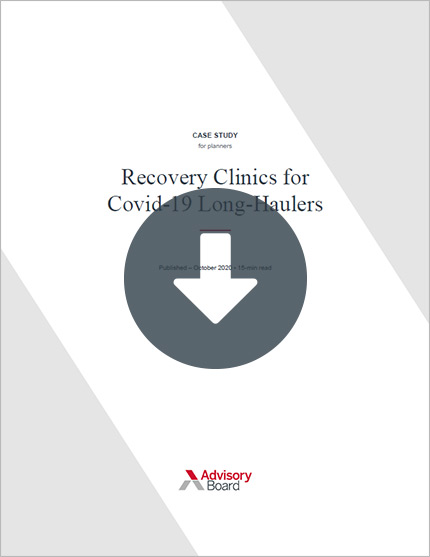Auto logout in seconds.
Continue LogoutFitbit data indicates that people who contracted Covid-19 have long-term behavioral and psychological symptoms—including elevated heart rates—and these symptoms endure longer than do similar symptoms in people suffering from other respiratory illness, according to a new JAMA study, Emily Anthes writes for the New York Times.
Recovery clinics for Covid-19 long-haulers
Study details
The study involved a subset of participants in the Digital Engagement and Tracking for Early Control and Treatment (DETECT) trial, which is run by researchers at Scripps Research Translational Institute.
More than 37,000 participants enrolled in the trial between March 25, 2020 and January 24, 2021. For the trial, the participants downloaded the MyDataHelps research application; agreed to share information recorded by their wearable devices, including Fitbits and Apple Watches; and disclosed any symptoms and Covid-19 test results.
In October 2020, the researchers published findings in Nature Medicine suggesting that combining wearable data with participants' self-reported symptoms was a more accurate way to detect Covid-19 cases than relying only on self-disclosed symptoms. They then decided to use wearable data to assess what happened to participants who had contracted Covid-19 and subsequently recovered from the "worst of the illness," the Times reports.
So, for their latest study, the researchers monitored 875 individuals who reported symptoms of respiratory illness and who were tested for Covid-19. Of the symptomatic participants, 234 tested positive for the coronavirus, while the others were presumed to have other respiratory infections.
The researchers then compared the resting heart rates of these Covid-positive individuals with those who were symptomatic but tested negative.
Key findings
The researchers found that while both symptomatic groups slept more, walked less often, and had higher resting heart rates once they fell ill, these changes were more prominent in people with Covid-19.
For the heart rate data in particular, the researchers found that the heart rates of participants who tested positive for Covid-19 slowed again about nine days after they first reported symptoms—a dip not recorded among the control group. However, according to the researchers, Covid-positive individuals' heart rates later increased again—and this time, they remained elevated for months.
Telehealth primer: Wearables
Overall, it took Covid-positive individuals an average of 79 days for their resting heart rates to return to normal, compared with four days for those who tested negative for the coronavirus.
Additionally, about 14% of Covid-positive participants' heart rates remained more than five beats per minute above their normal rate even one or two months post-infection, and for this subset of patients, their heart rates remained above normal for an average of 133 days. Moreover, these patients were considerably more likely than other Covid-positive participants to report a serious cough, shortness of breath, and body aches when their illness was most acute.
Comments
Some doctors said prolonged heart rate elevation may be a sign that Covid-19 affects the autonomic nervous system. "Lots of people who get Covid end up getting autonomic dysfunction and a kind of ongoing inflammation, and this may adversely affect their body's ability to regulate their pulse," Jennifer Radin, an epidemiologist at Scripps who leads the DETECT trial, said.
Radin added that while the DETECT study did not ask participants to continue reporting their symptoms beyond the acute phase of infection, researchers plan to do so for future research.
"We want to kind of do a better job of collecting long-term symptoms so we can compare the physiological changes that we're seeing with symptoms that participants are actually experiencing," Radin said. "So this is really a preliminary study that opens up many other studies down the road."
Separately, Robert Hirten, a gastroenterologist and wearables expert at the Icahn School of Medicine at Mount Sinai, who was not involved in the study, said the research was "interesting" and "important." He added, "Wearable devices offer an ability for us to be able to monitor people unobtrusively over long periods of time to see in an objective way—how really has the virus affected them?" (Anthes, The New York Times, 7/7; Radin et al., Journal of the American Medical Association, 7/7)
Download the case study

Several health systems have set up dedicated recovery clinics to help treat and coordinate care for long-haulers. This resource provides an overview of Covid-19 recovery clinic models pioneered by two early adopters—The University of Iowa Hospitals and Clinics and the University of Pennsylvania Medicine—and considerations for assessing whether it is a model you should pursue.
Don't miss out on the latest Advisory Board insights
Create your free account to access 1 resource, including the latest research and webinars.
Want access without creating an account?
You have 1 free members-only resource remaining this month.
1 free members-only resources remaining
1 free members-only resources remaining
You've reached your limit of free insights
Become a member to access all of Advisory Board's resources, events, and experts
Never miss out on the latest innovative health care content tailored to you.
Benefits include:
You've reached your limit of free insights
Become a member to access all of Advisory Board's resources, events, and experts
Never miss out on the latest innovative health care content tailored to you.
Benefits include:
This content is available through your Curated Research partnership with Advisory Board. Click on ‘view this resource’ to read the full piece
Email ask@advisory.com to learn more
Click on ‘Become a Member’ to learn about the benefits of a Full-Access partnership with Advisory Board
Never miss out on the latest innovative health care content tailored to you.
Benefits Include:
This is for members only. Learn more.
Click on ‘Become a Member’ to learn about the benefits of a Full-Access partnership with Advisory Board
Never miss out on the latest innovative health care content tailored to you.
